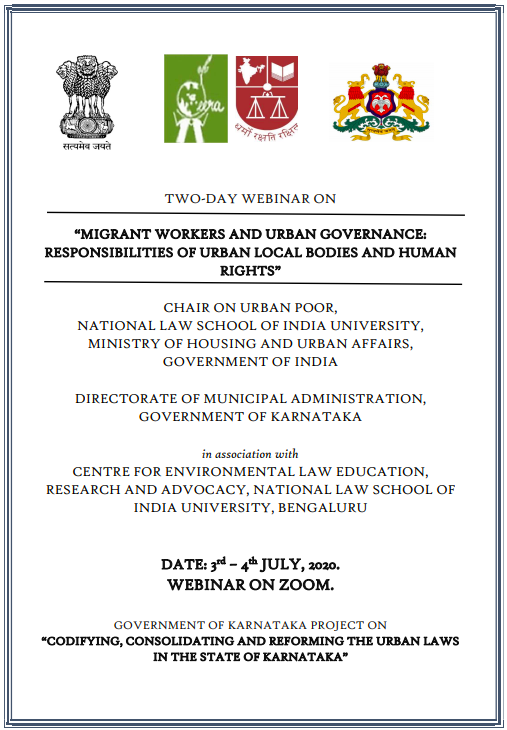TWO-DAY WEBINAR ON
MIGRANT WORKERS AND URBAN GOVERNANCE: RESPONSIBILITIES OF URBAN LOCAL BODIES AND HUMAN RIGHTS
Recent spread of a deadly pandemic like COVID-19 has exposed the foundational lacunas in the system which led to mass exodus of the migrant workers rushing back to their hometowns. Desperate to leave the urban areas and to reach their hometowns the migrant workers have rather resorted to dangerous off routes by walking hundreds of kilometres. Movement of workers in India from across different parts of the country in search of better life and livelihood is not a phenomenon of the recent past. Due to lack of requisite skills, education and training, the unskilled individuals are engaged in hazardous menial jobs for a meager pay. Migrant workers contribute a major part in the economic development of the country. Rapid urbanisation triggered large scale migration from rural to urban areas. Aspirations of the migrating workers lie in the big urban centres that are emerging as the economic powerhouse in their respective regions. Large urban centres in India for example, Delhi, Mumbai, Bengaluru, Hyderabad, Calcutta, Chennai and other cities have absorbed these migrating workers from remote parts of the country for different activities. But do the cities have adequate infrastructure and facilities for these migrant workers?
A country striving to achieve economic prosperity with abundant potential in terms of resources (both human and natural), imposed an unprecedented lock down due to the spread of infectious virus which not just manifested the preparedness to tackle an emergency of this sort, but also exposed the frailties in the system. For a country with population of over 130 crores, the public systems including the infrastructure for housing and providing labour entitlements seems out of reach for any Government. Due to the lack of requisite skills and disparity in the pay, the migrant workers form a major chunk in what constitutes the urban poor. Due to limited access to quality essential services like food and healthcare services that the migrant workers are seldom provided, they are always found to be at the rough end of the stick. One of the major issues which is plaguing the major urban centres is providing housing facilities. Increase in land value coupled with spike in commercial activities pushes the underpaid workers to settle in areas which are not suitable for residing. These undeveloped areas, which are often due to encroachments, find large clusters of huts or small shelters accommodating huge number of people in unhygienic conditions or in other terms called ‘slums’. Working conditions of the migrant workers, who moved from rural to high growth urban areas in search of employment, has been everything but good. Invisible and isolated, the obliviousness in granting recognition by the Governments despite ‘building’ the city, the migrant workers have persisted on the margins. Hence, the obvious question that arises is – whether the migrant workers are being neglected? For the protection of migrant workers, Inter-State Migrant Workmen (Regulation of Employment and Conditions of Service) Act of 1979 has been enacted.
The three-tiered governance structure in our country has led to decentralisation of various responsibilities from the State and Central Government to the Municipalities and Panchayats. Role of Municipalities and Panchayats therefore, becomes crucial in handling the issues of migrant workers. The averseness in considering the migrant workers under the scheme of policy making has left them in lurch triggering a large-scale humanitarian crisis. Tasked with the role of providing basic amenities to the residents, the Urban Local Bodies (ULB’s) play a great part in protecting the migrant workers within its jurisdiction. The Constitution of India in its Eleventh and Twelfth Schedule have specifically provided for the responsibility of framing plans for towns, housing, poverty alleviation, slum improvement amongst others. Mass migration of the workers could be attributed to several factors like loss of job and consequential loss of earning which leads to a cyclic problem of payment rents, maintenance of family and access to other basic necessities. Apart from the financial instability, there are other natural factors like extreme heat and cold weathers in several states like Delhi, Uttar Pradesh, Rajasthan and other Northern states. The Government of Delhi has provided shelter homes for people seeking refuge during the cold months and this responsibility is taken up in collaboration with the State Government. Providing accommodation to the migrants who are constantly on the move also has to be considered for which the Central Government has introduced a new scheme called Affordable Rental Housing Complexes (ARHC). The role of ULBs, therefore attains prime consideration with the responsibilities laid down in the Constitution and under various other statutes.
Pervasive challenges for hundreds of thousands of migrant workers still remain due to massive logistical and implementation challenges due to the sheer number of population. Increase in the number of infections on a daily basis has posed tremendous challenges to the Local Self-Governments or ULBs. Financial burden on these bodies in terms of collection of taxes and other revenues have taken a hit. ULBs have a history of poor financial health and huge gap in the urban infrastructure and delivery of services. Instead of strengthening the efficiency in delivery of service by Municipal bodies, the parastatals have been brought in to address a specific issue. These parastatals (Authorities or Boards) are controlled directly by the Central or State Government. This results in a conflict in the functioning of authorities resulting in weakening the Constitutional authorities like Municipalities. Providing healthcare services for these workers reflects the infrastructural upgradation with an adequate capacity to handle. To tackle a pandemic or a disaster of this magnitude the Municipalities must be reinforced in terms of finances, technical expertise and manpower. Mass migration of workers and the resultant problems has shown the underlying problems to the administration. Judiciary has played a major role in highlighting the issues for the Government and passed necessary orders and directions for the welfare of migrant workers. The Supreme Court, after facing flak from various corners, took of the issue of migrant workers. However, much before this, several High Courts took cognizance and passed necessary orders to the authorities concerned.
The policy and legal enquiries followed by Missions, Projects etc., are entirely the role of ULBs in relation to Housing, Infrastructure development, Civic Amenities, Living Conditions, health, hygiene and, in a limited way, quality of life which would marginally include the environmental aspects. This needs broadening both in focus and ambit. The real difficulties experienced by Migrant Workers, over all the above mentioned aspects, have very little to do with the responsibilities of ULBs and the State Govt., and hence one would find very little legal prescription in the laws taken for enquiry. The plight of the Migrant labour (“the real back-bone and builders of the city”) is entirely the handiwork of those who bring/draw them to the city and engage them in the work. It may be a Property Developer, Building Contractor, Public Works Contractor and their cohorts. The obligation is entirely upon these players, to provide those “creature comforts” to the migrant workers. In our effort, we may attempt to shed more light on this aspect as to how to strengthen the ULB Laws and their working by incorporating specific provisions that would fix clear obligations on these entities, procedures and institutional arrangements to oversee compliance and initiation action for violations. Such action has to be followed by efforts in aligning other related laws that have something or the other to do with unorganised labour/ industry, Health Care System, Environmental Regulations etc.
The Two-Day Webinar is a collaboration of the Chair on Urban Poor under the Ministry of Urban Affairs and Poverty Alleviation, Government of India; Directorate of Municipal Administration, Government of Karnataka with CEERA-NLSIU.
PAPER PRESENTATION AND SUBMISSION
The Webinar invites well researched original research papers, case studies and survey reports are from the academics, practitioners, researchers, students and other stakeholders working and interested in this area. Research papers shall be subject to the approval of Editorial Board for inclusion in the seminar proceedings. All research papers shall be subject to scrutiny of anti-plagiarism software. Selected papers will be published as E-Magazine in IN LAW Magazine, NLSIU bearing ISSN: 2349-624X.
The themes are only illustrative. Participants may select the related topics covered under the main themes –
- Role of Municipality and Governance for Migrant workers;
- ULBs and Quality of life, Healthcare services, Hygiene, sanitation and Environment for Migrant workers;
- ULBs and Housing facilities, Civic amenities and Living conditions for Migrant workers;
- ULBs and Food and adequate nutrition for migrant families;
- Transport and mobility services;
- Economic and financial support;
- ULBs and labour entitlements of migrant workers;
- ULBs and Protection of Women migrant workers and children;
- Use of technology and tracking migrant workers;
- Smart Cities and Migrant workers;
- Migrant workers and Labour welfare.
- Gig economy and Migrant Workers.
- Urban Missions and Schemes in relation to Migrant workers.
- Non-state Actors and plight of migrant workers.
SUBMISSION GUIDELINES
- Abstracts of not more than 500 words, of original research papers on the above-mentioned themes are invited. Abstract must be submitted as Word documents, with a covering letter containing the name and designation of the author(s) for pre-scrutiny and confirmation.
- There can be a maximum of two authors for each abstract/paper.
- All Abstracts to be sent via e-mail to Raghav Parthasarathy at raghavparthasarathy@nls.ac.in on or before date June 25th , 2020.
- Authors of shortlisted abstracts shall be required to register on or before June 25th, 2020.
- The full-length research papers in case of short articles should be 3500 –5000 words (exclusive of foot notes).
- Authors are required to adhere to a uniform style of citation (20th Edition of The Bluebook is recommended).
WHO MAY PARTICIPATE?
- Academicians, Researchers and Ph.D/Doctoral Scholars from the field of Urban Planning and Management;
- Lawyers and Legal Professionals, Consultants;
- Government Officers, Officers of Public Sector Undertakings;
- Representatives of Governing and Regulatory Bodies;
- Stakeholders from Non-Governmental Organisations, Think-Tank Groups, etc.
IMPORTANT DUE-DATES
- Participants are encouraged to register before June 25th 2020;
- Submission of Abstracts along with Registration: June 25th 2020;
- Selected Abstract Communication: July, 28th 2020;
- Submission of Final Paper (After the Webinar): July 30th, 2020;
- Date of Seminar: July 3rd and 4th, 2020.
REGISTRATION FEES
- Participants may register by paying a registration of fee of 500/- (Five Hundred rupees only) to be paid by NEFT/ RTGS/ IMPS/ Demand Draft in favour of DIRECTOR NLSIU SCHEMES AND PROJECTS, payable at Bengaluru, along with the duly filled Registration Form attached. Upon remittance of Course Fees, the participant(s) shall send the Transaction Details along with a duly filled Registration Form to Ms. Susheela at susheela@nls.ac.in
- Participants will be awarded E-Certificate and not in print.
BROCHURE - TWO DAY WEBINAR



